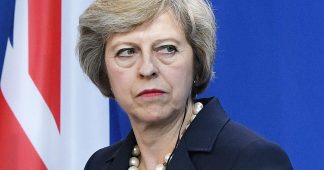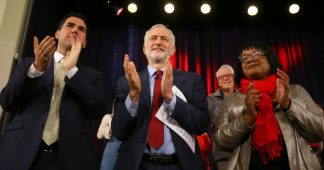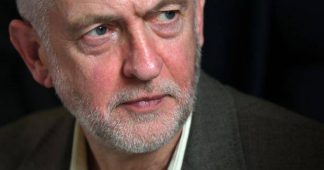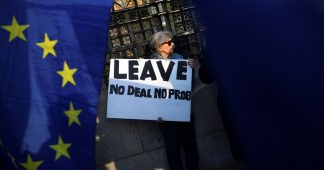by Brendan Donnelly
April 17, 2019
It is easy to sympathise with last week’s reluctance of President Macron and other EU-27 leaders to endorse an extension of the Article 50 Brexit negotiations until the end of October 2019. There is a real chance that in six months the present bad-tempered and confused impasse in the House of Commons will still be in place. Brexit has created for the British political system a series of intractable dilemmas that will be no more attractive or easily resolved over the coming months than they are now. The European Council of mid-October may be confronted with a very similar menu of Brexit options to those it considered last week.
Even so, the decision to extend the Brexit negotiations for six months (unless the Withdrawal Agreement is accepted by the House of Commons in the meantime) was probably the correct one, both for the UK and the EU. It appears from accounts of last week’s summit that many of those arguing for only a short extension believed that pressure of time would serve to accelerate a clear UK decision. If so, this was a false analysis. The crippling introspection and indecision of the Commons would have been incapable of resolution by the end of May. Within such a short period of time the only decision which MPs would have been able to take was “no decision”, triggering a “no deal” Brexit – an outcome disastrous for the UK and damaging for the EU. A longer extension gives at least some chance that the internal configuration of British politics will have changed in a way permitting greater clarity and rationality by the end of the year. Six months is a long time in the politics of Brexit. Several developments in British politics can be imagined that could make the six-month extension seem in retrospect a wise decision. The European Elections may well be one such occasion.
It was to the credit of the Prime Minister that in the final analysis she preferred to court the wrath of her Party by accepting a longer extension rather than tolerate the national disaster of a “no deal” Brexit. As so often, however, she has sought to disguise the real implications from her Party. She affects to believe that it will still be possible to leave the EU early next month and thus avoid the holding of European Elections. The likelihood of this happening is, however, remote. Negotiations with the Labour Party to facilitate an early Parliamentary acceptance of the Withdrawal Agreement continue but are highly unlikely to bear significant fruit. The PM and her Deputy David Lidington appear to envisage changes to the still amendable Political Declaration, the non-binding document which accompanies the unchangeable Withdrawal Agreement. But any changes to the Declaration likely to be attractive to Jeremy Corbyn would inevitably alienate further the Conservative Party and would not necessarily be acceptable to his backbenchers. Nor could Mr. Corbyn be sure of a Labour Parliamentary majority to support changes to the Political Declaration unless the Prime Minister had committed herself to the holding of a People’s Vote. This would never, in any circumstances, be acceptable to her party. The negotiations with Labour are simply the latest attempt to postpone the evil day when the Prime Minister is finally confronted with the unavoidable consequences for her Party and the country of her pursuing for imagined Party interest the goal of Brexit, a course which she knows to be in reality highly damaging to the country.
Danger for the Conservatives
Despite Theresa May’s aspirations to the contrary, it seems therefore overwhelmingly likely that European Elections will take place here on 23rd May. These will be profoundly divisive for the Conservative Party and a poor result on 23rd May could well follow hard on the heels of equally disappointing results in local elections on 2nd May. By the end of May we will know much more about the two related issues that will shape the course of the Brexit debate until October: Can the already fragile unity of the Conservative Party survive in any meaningful way the European Elections? Will the Labour Party endorse unambiguously “Remain” or a People’s Vote during these elections?
Much of Conservative European policy during the last five years has been dictated by the fear of losing votes and members to UKIP. Theresa May will be suffering a double dose of this fear as she contemplates the healthy opinion polling numbers for UKIP and its sibling, the Brexit Party. Conservative rank-and-file members are known already to be deeply unhappy at the terms of the Withdrawal Agreement negotiated by the Prime Minister; this unhappiness has been compounded by widespread resentment of her well-publicised negotiations with Labour. A Conservative manifesto for the European Elections pledging to support the Withdrawal Agreement would repel many Conservative members and probably lead to a number of resignations. It is difficult to see how Theresa May and her Party could conduct a remotely coherent or credible Euros campaign. The results will almost certainly be appalling for them. For a party structured like the Tories, electoral disaster represents another level of unacceptability beyond even the divisions and rancour which have torn the Parliamentary Party apart in recent months.
A new Conservative leader?
While the Prime Minister is safe from internal Conservative challenge under the Party’s present leadership rules, it should not be assumed that those rules are immutable. There has already been a public call for an emergency procedure to call a new leadership election. There must moreover be a level of dissatisfaction within the Parliamentary Party such that personally and politically Theresa May, despite her well-proven obstinacy, will be incapable of further resistance. The European Elections may well be the straw that breaks the Prime Ministerial back. The succeeding leadership competition, for which a number of Cabinet ministers are already positioning themselves, might well do the same for the Party’s future overall unity. There are a significant number of Conservative MPs who have signalled more or less publicly their unwillingness to remain in a Conservative Party led by Boris Johnson or Dominic Raab, both of whom would be powerful candidates among the all-important Conservative membership. The Conservative Party may not even exist in its present form by the Parliamentary break in July, let alone by 31st October.
Some of the most vociferously pro-Remain political parties, such as the Liberal Democrats, the Greens and ChangeUK, hope to be able to turn the European Elections into a “soft referendum” on Brexit. The credibility of any such message will depend very largely on the manifesto adopted by Labour, which is unlikely to present itself unequivocally as a “Remain” party but may adopt in its manifesto a clearer commitment to a People’s Vote. Such a political commitment would be immensely significant. It would create the real possibility that more electors would vote for parties advocating a second referendum than for those hostile to it. A result along these lines would reassure and encourage those many MPs hostile to Brexit who have allowed themselves to be bludgeoned politically and intellectually by the dangerous and foolish concept of the “will of the people”, supposedly manifested irreversibly in the 2016 referendum.
But will Jeremy Corbyn will be capable of such forthrightness in his party’s Euros manifesto? He has had ample opportunity to make such an unequivocal commitment since the Labour Party Conference firmly pointed in September 2018 towards advocacy of the People’s Vote. The Leader of the Party, however, has spent the last eight months moving crab-wise alternately towards and away from this commitment. There is reason to believe that he, in a way very similar to the Prime Minister, would like to avoid participating in the European Elections. The fissures they may expose in his party are a probably less virulent mirror-image of those which beset the Conservative Party, but they create problems for his leadership, nevertheless. The pressure on him during the Euros to abandon equivocation, emanating from inside and outside Labour, will be immense.
The dam breaks
The past three years of the Brexit merry-go-round have of course been full of supposed hard deadlines and decisions that can no longer be postponed. That these deadlines have so regularly been confounded by events is one reason why the Brexit process has been so confusing and frustrating to observers and participants. The European Elections may turn out to be a similar episode in the never-ending saga. It may be that Theresa May can survive appalling results and limp on as the unpopular leader of a divided Conservative Party. It may be that, contrary to expectation, Jeremy Corbyn can achieve a respectable Labour result without abandoning his traditional ambiguity on the Brexit issue. But neither of these outcomes is likely. It would be surprising indeed if both outcomes emerged from the European Elections.
Theresa May knows that the stratum of British political and public opinion to which she can appeal in the European Elections is vanishingly small. The results for her party in these elections can scarcely be other than humiliating. Two sets of disastrous election results in the month of May could well break the dam holding back the frustration and hostility of her Conservative opponents. Jeremy Corbyn starts from a less perilous position than the Prime Minister’s but he will be uncomfortably aware that Labour risks haemorrhaging votes to the Liberal Democrats, the Greens and ChangeUK if they can plausibly accuse him of half-hearted and continued equivocation in his opposition to Brexit. The system of closed regional lists leaves little flexibility for local candidates to refine or distance themselves from the central European message emanating from Jeremy Corbyn himself. The need for clarity on his part can only grow as the election campaign proceeds. It is widely believed that Jeremy Corbyn is simply uninterested in the European Union. The European Elections will be a salutary reminder that the EU is interested in him in a way he cannot escape by a simple act of political disengagement.
If, after the European Elections, the UK is confronted with a disintegrating Conservative Party and a Labour Party formally and publicly committed to a People’s Vote, then Donald Tusk and others in the European Council will have good reason to be satisfied with their own patience. There have been EU-27 leaders uneasy at the prospect of European Elections in the UK, fearing the victory of a long list of radical Eurosceptic MEPs. This fear may be overstated, given the divisions within the British Eurosceptic ranks and the growing mobilisation of pro-European forces in the UK. But the likely reordering of British politics to be ushered in by the European Elections in the UK can only be seen in Brussels and elsewhere as a highly attractive consequence of last week’s decision by the European Council. The October summit may have a wider and more appealing range of Brexit options to consider than they expected in hesitatingly conceding (imposing) last week an extension of the negotiations until Halloween. The trick of the European Elections in the UK could well have produced the treat of a British People’s Vote before the end of 2019.
Published at https://fedtrust.co.uk/european-elections-in-the-uk-a-brexit-turning-point/











